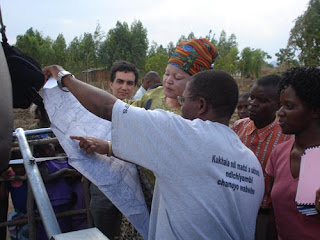 The Honorable Patricia Kaliati, Minister of Information, underlined the importance of the water interventions that ADRA conducts in Mulanje. ADRA’s activities in the scope of the Integrated Health and Food Security Project provided 129 water points and a gravitational water system in two districts in Malawi.
The Honorable Patricia Kaliati, Minister of Information, underlined the importance of the water interventions that ADRA conducts in Mulanje. ADRA’s activities in the scope of the Integrated Health and Food Security Project provided 129 water points and a gravitational water system in two districts in Malawi.ADRA Malawi recently officially handed over 21 newly drilled boreholes, 5 shallow wells and 25 rehabilitated boreholes to Mulanje District Assembly and the local community as part of the exit of the 3 year Danida Funded Health and Food Security Project (IHFS). The water points will now be managed by village committees with the support of the government water department through the assembly.
The colorful handover ceremony which was graced by the presence of the Ministry of Information who is also Member of Parliament for the area Hon. Patricia Kaliati, the Director of Planning and Development for Mulanje District and other officials from government departments and other NGOs. In her remarks Kaliati commended ADRA Malawi for development work the organization is doing in the area. She challenged the community to take care of the water points and fight against vandalism of the borehole parts.
According to the District Director of Planning and Development, water is the districts second priority and that the gesture by ADRA and DANIDA would be followed by expected care of the water points by the communities, led by the district assembly.
The project is in 2 districts and has in total sunk, rehabilitated or dug 129 water points and established a gravity fed water system which has 3 outlets into the community. Each water point serves about 450 to 500 people. Therefore touched the lives of about 60,000 people with safer water. Each water point has a committee of 10 people who have been trained in water point management, hygiene and sanitation.
As the saying goes ‘Water is life’. ADRA Malawi had through this 3 year project touched and improved the quality of life for about 60,000 people. The gains of having access to clean water can not be over emphasized. Not only will this important resource help reduce cases of water borne diseases caused by drinking contaminated water, but there are also socio-economic benefits are the amount of time rural women and children spend in a day collecting water from distant and often polluted sources is reduced and they can contribute more to other livelihood strategies.
Author: Thoko Mwapasa
IHFS Project Manager
ADRA Malawi
No comments:
Post a Comment